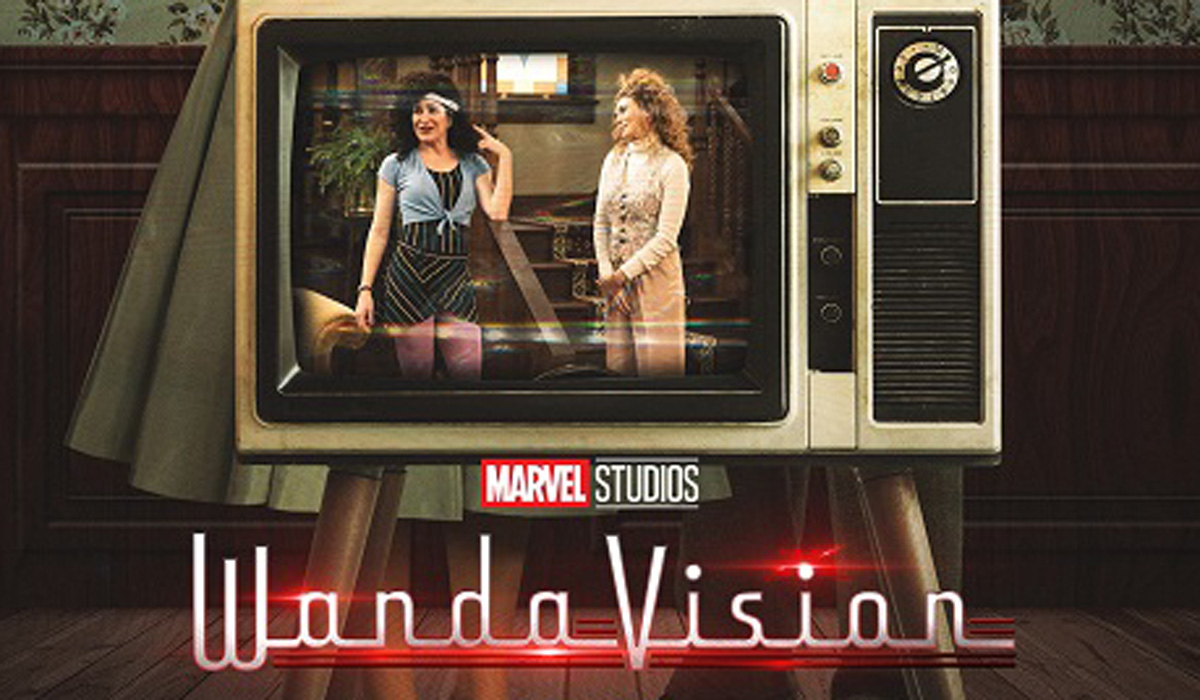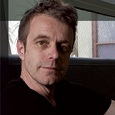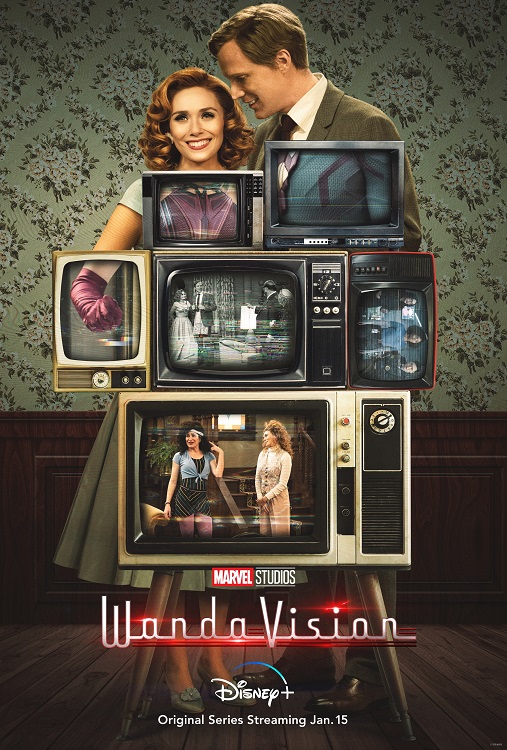 Do we really need to introduce WandaVision, that unique blend of classic television and the Marvel Cinematic Universe in which Wanda Maximoff and Vision—two super-powered beings living idealized suburban lives—begin to suspect that everything is not as it seems?
Do we really need to introduce WandaVision, that unique blend of classic television and the Marvel Cinematic Universe in which Wanda Maximoff and Vision—two super-powered beings living idealized suburban lives—begin to suspect that everything is not as it seems?
Marvel Studios’ foray into the world of the sitcom celebrates the genre in a big way. “The story imagines Wanda and Vision in a 1950s sitcom — when the show opens, that’s presented without explanation,” says head writer Jac Schaeffer. Then, “we see them move thorough the various eras of sitcoms as the series progresses.”
And music plays a huge part in setting all the moods of the series. The WandaVision filmmakers’ research and detailed examinations of sitcoms throughout television history yielded a common thread: theme songs. The nature and style of the songs changed over the years—creating almost a calling card for each era. This signature element enhanced the authenticity sought for WandaVision, and cemented its roots in classic sitcoms. Kristen Anderson-Lopez and Robert Lopez created unique theme songs for episodes to reflect the eras spanning from the 1950s to the early 2000s. Just as they did on Frozen and Frozen II, they appealed to Dave Metzger, who worked as an orchestrator on The Lion King, Tarzan, Captain America: The First Avenger, Avengers,Wreck-it-Ralph and Moana to name just a few, to arrange them.
A true fan of all those series, Metzger’s versatility and affinity with all kinds of styles and ensemble made him just the right person to turn to in order to bring an authentic, vintage flavor to all these songs, among which is the instant classic “Agatha All Along”.

Animated Views: How did you come onboard this very unique series that is WandaVision ?
Dave Metzger: The main reason why I came is Bobby and Kristen, the songwriters of WandaVision. They kinda make everything special and a lot of fun to be involved in. So, when they got the job, they asked me to be involved. It turned out to be a very interesting series. I didn’t expect that, but I just got really completely wrapped up (in it)!
AV: How do you work with them?
DM: Bobby and Kristen give me a piano part with their scratch vocals, and I use it to do a mock up. So I use my computer and samples to do my arrangement of their songs.
AV: The first song of the series is “A Newlywed Couple”. Can you tell us how you approached it?
DM: That one is very much inspired by The Dick Van Dyke Show, so we wanted to capture that reference sonically just as visually. They tried to make it look like it was from the era. So, we tried to do the same with music.
AV: How did you emulate the sound of the orchestra of the original series?
DM: It wasn’t really too much of a stretch to capture it stylistically, because I’ve watched all these shows so much as a kid. I knew all these themes so well, and the styles of them. I had really grown up with so many of them. So, on all these references, I always went back to the original material. But it wasn’t just a question of style. We also tried to make it sound the same way they recorded back then.
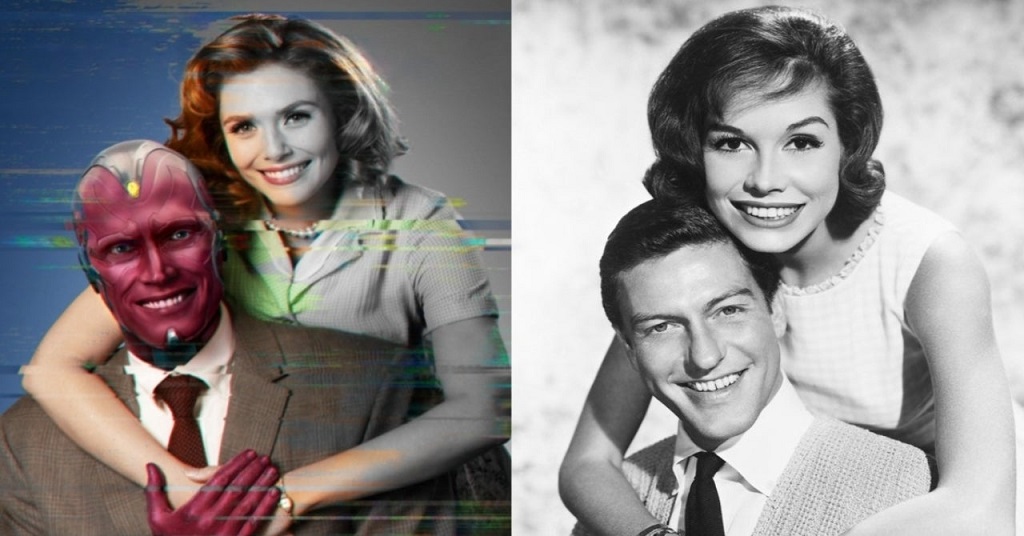
AV: How did you achieve that?
DM: Part of it was the engineer. They used vintage microphones. But today, you know, working with ProTools, there’s no tapes ; whereas, the sound of that period came also mostly from the fact that they recorded on magnetic tapes going through. So, for the demo of that song, I actually used a plug-in. I think it was a tape machine, to add a little bit of a feel of a sound like it was recorded on old magnetic stuff. That was for my sample demo, so the engineer tried to emulate it.
AV: What’s interesting in your approach is that, even if the style and the sound are highly referential, you allowed yourself some liberties.
DM: Indeed, it was really more of a using of the Dick Van Dyke theme as a reference point than recreating it. So, there are some differences because the Dick Van Dyke Show theme didn’t have any singing. I had to adapt a little bit to that. And the way Bobby and Kristen wrote their song, they had a different tempo, so I had to change the drum pattern a little bit.
Also, we wanted to add some comedic elements, so even if I went back to the period, I didn’t want to be completely restricted by the instrumentation. So, I used woodwinds that are not really in The Dick Van Dyke Show, which add another layer. I had five saxophones and I added five woodwinds, flutes and clarinets.
AV: How did you find the right balance between authenticity and creativity?
DM: I had an advantage in this situation because I had new material to work on. Bobby and Kristen did that part by writing new songs. They did the hard work, really, of getting a piece of the era. So, it was just up to me to capture the nuances and the style in the orchestration side of it instead of having to come with a whole new concept.
AV: How did the recording go?
DM: We recorded that material in October. Honestly it was a little bit of a challenge because of Covid. We recorded in London, at AIR studios; and because of the pandemic, we weren’t able to work like we did before with a line of trumpets, a line of saxophones, and a line of trombones. They had to be separated by something like three meters. But David Boucher, our engineer, was really able to get around those problems.
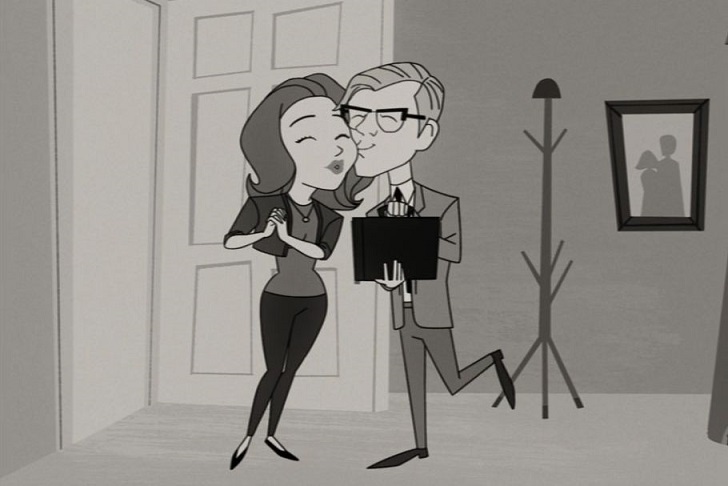
AV: The second episode of the series is obviously a nod to Bewitched!
DM: I watched that series so many times as a kid that I knew it perfectly. But the way Bobby and Kristen wrote that song wasn’t just Bewitched. More of the early 60s vibe that was going on, and Bewitched was kind of the reference point. They did such a great job in alluding to the periods of the songs. For that one, I knew they wanted a jazzish-Bewitched melding of things. So, that was enough direction to really find the right place for that song. The one thing that was so infectious to me was the break with the spoken words “WandaVision!”. I remember the first time I heard the demo, I thought it was just perfect.
At the beginning of that animated sequence, there’s a moment where Wanda and Vision are flying together and are drawing a heart in the sky. Bobby and Kristen hadn’t addressed that in their song, but for me, I immediately remembered when Samantha did that kind of thing in the opening title of the original series. I chose not to use any of the Bewitched elements specifically but I remembered there was that swirling kind of thing. So, I wrote something in the same vein for the woodwinds, a line that I was able to drop in for that very moment.
AV: And then there’s “We Got Something Cooking”, the theme song for the third episode.
DM: To me, it was always The Partridge Family, and also The Brady Bunch. It’s a combination of those two things, which, again, I watched every episode fifty times or so! That’s embarrassing to say now, but at the time, I was like 10-11 years old, and that’s what we were all watching on TV! It was interesting, because it was a chance to catch up with that late 60s – early 70s kind of groove. In that song, we had a couple of passes of guitar, a piano, and a vintage 1960s P-Bass. I think we had a little Farfisa in that, too. I went back and listened to The Brady Bunch, and that was my guiding line, especially on the brass instruments. So, I also put three trumpets and three trombones, but no saxophones.
Also, it was particularly fun to put an harpsichord in it, because that was part of the sonic footprint of that theme song in The Partridge Family, with all these arpeggios. It’s at the beginning in the original song, and on the bridge in ours. Another fun thing is that I’m an adequate bass player and I play the bass in every one of my demos. It’s part of my demo process. And on that version, I also did the tambourine.
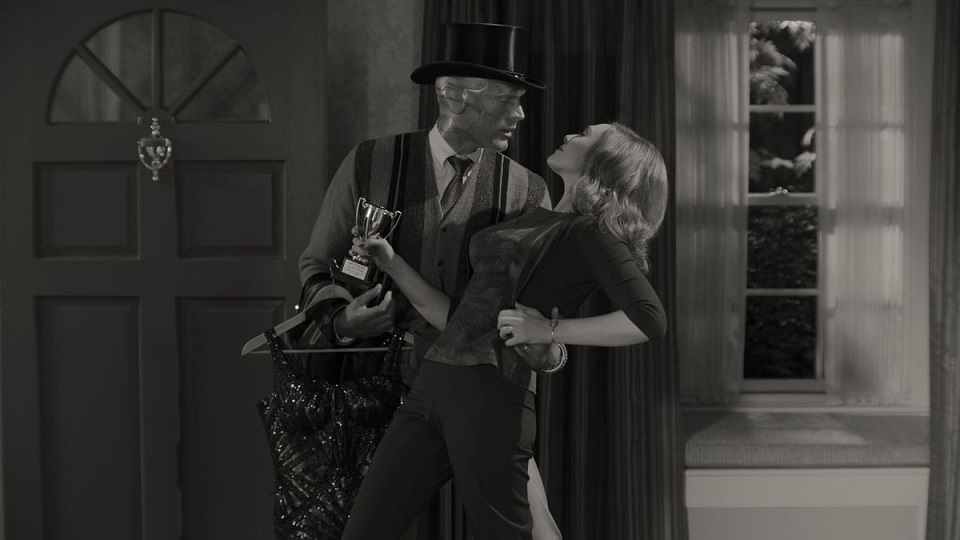
AV: That means that every episode required a different ensemble, which is quite unusual in the realm of film scoring.
DM: Absolutely. That was one of the big challenges for sure. But also, one of the things that made it so fun – to be honest, this was one of the most fun (projects) I’ve ever worked on!
AV: The songs of the series are composed mostly for a harmony.
DM: I made some suggestions here and there, especially for the Dick Van Dyke one, but in general the vocal arrangements were done mostly by Bobby and Kristen, which they sang in their demo. For the recording, we appealed to other singers, but as they’re used to singing in most of their movies, they blended in with these singers as well.
AV: Now we jump to episode 5 with “Making It Up As We Go Along” which seems to go back to Family Ties and Full House.
DM: That’s exactly right. That one was trickier for me from the standpoint of finding the right balance of keyboard sounds that kinda match up with the period. In order to do so, like for the other episodes, I tried to go back and remember. Back then, I was very early in my career. Obviously, I sold every vintage keyboard that I had at that time, a long time ago. So, it was more a matter of finding sample libraries that replicating those sounds. For the strings, we used a sample of Mellotron, because that what was used in that era. At that time, also, the guitars were a little bit more getting into electric. That song was the hardest one, as far as it took a lot of back and forth to get to the point where Bobby and Kristen were happy with the sound, because initially I went a little bit too much into electric piano than they had envisioned.
AV: What about “Let’s Keep It Going”, which parodies Malcolm in the Middle?
DM: Actually, for that one and The Office one, they went to specialists of those eras. So, I wasn’t part of them.

AV: And now we come to “Agatha All Along”, certainly the masterpiece of the series!
DM: That was probably the most fun of all. It’s really based on The Munsters, the television series, which again I watched too much when I was a kid! It’s the perfect example of Bobby and Kristen’s brilliance. They can come up with this kind of campy song, but it has such a huge hook to it. And there’s always these four notes, the famous WandaVision motif that you can find in every song since the beginning. The lyrics are so clever, too. So, there wasn’t really much I could do to mess it up (laughs)! I just had to go back to The Munsters and reference what sounds were being used, adding the mute trumpets for the four notes, and saxophones along with the trombone with chords played by the electric harpsichord (and again, that’s me playing that!). The other fun thing was the guitars. On my demo, I played the surf guitar kind of stuff. Very chordly, but it was enough to get the idea of that signature sound. For the recording, the guitar player brought a Telecaster. This guy had like a hundred period vintage guitars. You just tell him what you want and he brings it! So, we had the real Dick Dale kind of surf guitar sound. And we didn’t use any modeling for the amplifiers; he brought in vintage amplifiers, and the real things, not recreations! It really helped us make it sound as accurate as possible to the era.
I also had to find the right drum groove. And it wasn’t just the groove but the overall sound of the drums, so that it sounded like it was from that period. All of it kinda came together in a beautiful way. Again, the bass on that was an old 60s P-Bass which is exactly what they would have used, and I wrote in the score “jam thumb under the bridge,” because that was the real key to 60s P-Bass sounds: to get that sound you take just the thumb and you jam it under the bridge.
AV: And Agatha herself sings in the song, too!
DM: Kristen sang her part in the demo, and then we got Kathryn Hahn to record it. Her schedule is pretty tight, but she got just enough time to do it and she totally nailed it! We recorded the vocals in Los Angeles. So, the men were also recorded there, and Bobby’s voice was mixed in there, too.
AV: During your experience on the series, was it only about music, or did you have a wider scope on the series?
DM: I was able to get a wider scope of what was going on. If you just take these songs out of context, you don’t really understand what they are about, so it was really helpful to have some extra guides as well. In all these projects, I’m involved with the directors to really capture what’s going on. You can’t be working isolated. You must have a sense of what you’re trying to support.
AV: What are your best memories of that experience?
DM: The biggest ones were those treasure boxes every time I got the next song from Bobby and Kristen, to hear what it was gonna be. I’ve been always looking forward to hearing their piano/vocal demo. For me, it was also a lot of fun to do the research, finding the right instruments, and making sure I understood the real techniques to the things that were played, how they were played during the different eras and also, I suppose, the recording process, trying to make the demos sound well.
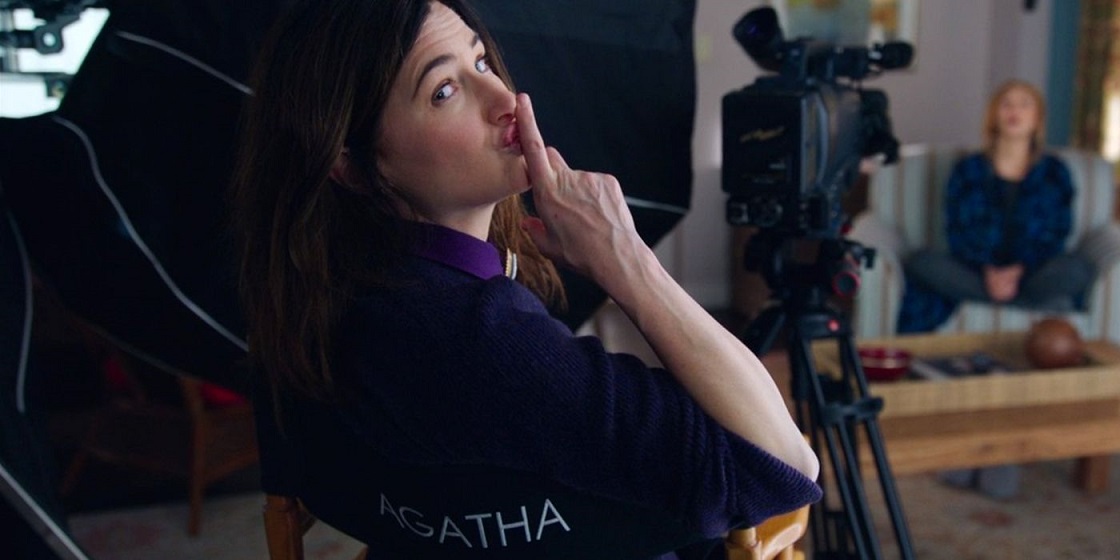
AV: WandaVision certainly made history as a series. And the music was essential in its success.
DM: I’m so glad to hear you say that, and I agree. It’s unlike anything I’ve ever seen before, and there were so many different levels to become engaged in it as well. You have these theme songs, one different for each episode, but still tied in thematically through the WandaVision motif, and the story line. The series engages you and makes you want to figure out what is going on. I’ve been so lucky in my career, and I think that’s just one of those opportunities that just sort fell out of the sky. I’m very grateful.



